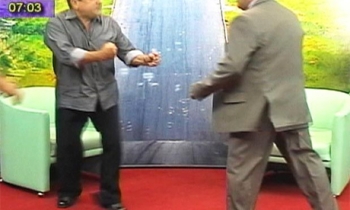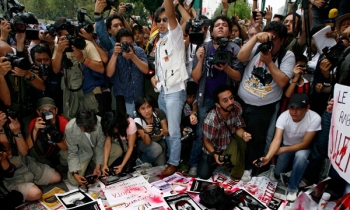Public life has sped up dramatically over the past 10 years or so. Politicians, Hollywood, corporate chieftains, and other newsmakers all have had to learn how to respond to news instantly – as it’s being made. Call it "The CNN Effect," a phrase that entered news jargon in the 1990s when the phenomenon jelled, thanks to the instant flood of real-time images of suffering and conflict transmitted from hot spots like Iraq, Somalia, and Bosnia. Cable television – fortified by talk radio – shattered older, more-leisurely news cycles and replaced them with a new form of instant reality that was more treacherous for the players and more emotionally charged for audiences and readers.
Now, a decade later, comes what we’ll call "The Romenesko Effect" – named after Jim Romenesko, who started a media Web site six years ago – which is transforming the news industry in a similar fashion. Using the new technology of the Internet to infuse newsroom scandals, gossip, and griping with tradition-soaked debates about journalistic ethics and practices, Romenesko and other online practitioners have democratized the closed and often-secretive news culture and put pressure on media executives to act more quickly under far greater scrutiny. The result: a heightened perception of public accountability.
In the old days, media controversies might merit mention in places like Newsweek or the Columbia Journalism Review and would stay entombed inside the journalism world. Now, they instantly erupt into national scandals that bounce around the media echo chamber and often penetrate the broader public consciousness. Sometimes, they even end up on the pages of the media outlets where the problem originated.
A number of online sites now serve as clearing houses for journalism-related news and analysis. They include the Daily Briefing by the Project for Excellence in Journalism, a media-research center and think tank; Mediabistro.com, an organization that began as a gathering spot for media types and produces a Morning Newsfeed and a half-dozen blogs; I Want Media, which often focuses on the business of news and posts stories throughout the day; and CJRDaily, a site that grew out of Columbia Journalism Review’s efforts to monitor election coverage and is devoted to media criticism and analysis.
The expanding blogosphere – where media scrutiny tends to be more ideologically driven – is also becoming a force. Among other things, bloggers played a role in discrediting a 60 Minutes Wednesday broadcast that questioned George W. Bush’s military record. They also helped publicize remarks made by CNN executive Eason Jordan about the US military targeting journalists in Iraq, which led to his resignation.
But the master of the genre is Romenesko’s home on the Web site of the Poynter Institute, a Florida-based center for journalism instruction. A former Milwaukee Journal police reporter, Romenesko collects reporting, gossip, commentary, letters, and memos from and about the journalism profession. By establishing a kind of town square where an event in one newsroom can be instantly relayed to a wide audience and then trigger a noisy clash over values and standards, Romenesko wields significant influence on media culture.
Take the case of exMiami Herald columnist Jim DeFede.
On July 27, DeFede was fired by the paper after he secretly taped a phone call with a public official under indictment right before that official killed himself.
News of DeFede’s firing triggered an intense reaction that made its way to Romenesko, with DeFede and his supporters claiming his punishment was unduly harsh. Explanations from the Herald executives, a petition backing DeFede, and DeFede’s call for an outside negotiator to resolve his status were all quickly posted. A professional arbitrator even wrote to Romenesko, saying the negotiator option was unrealistic. Everyone and his uncle had an opinion.
Finally, after Romenesko linked to a story from the weekly newspaper New Times airing the theory that Knight Ridder CEO Tony Ridder had ordered the DeFede firing, Herald executive editor Tom Fiedler fired back with a memo taking responsibility for the termination. The memo was posted on Romenesko, of course.
"Typically, I wouldn’t have responded to an article in the New Times," Fiedler says. "Since it appeared in Romenesko ... I felt it was important to respond."
Asked how he feels about having a personnel decision become a national controversy, Fiedler says, "I would not in any way advocate a cone of silence descending over me when I have to make these kinds of decisions." But he acknowledges that Romenesko "does become a factor in decision-making and the execution of a decision."
For his part, DeFede says the online debate "in some ways ... helped me.... But it wasn’t something I necessarily had control over. The power of Romenesko is, it’s completely unbridled. There is no controlling it."
THE GATEKEEPER
In an e-mail message, Romenesko writes, "I’m happy to post links about journalism issues and invite discussions, but I’m not sure how much clout my site has ... Jim DeFede hasn’t been rehired by the Miami Herald and newspaper owners have yet to lower their profit goals. I don’t think news bosses go: I’d better do this because that’s the consensus of Romenesko Letters contributors.’"
Romenesko is right to suggest that he is only the gatekeeper. And unlike other, more-freewheeling and unsavory online aggregators such as Matt Drudge, he plays by rules that don’t conflict with the profession’s standards. But what he does has turned out to be nothing short of revolutionary.
Steve Lovelady, managing editor of CJRDaily, sums up the point in an e-mail: "Romenesko has made all of print journalism, from the East Nowhere Daily Trumpet to the New York Times, a small village."
Journalists know that Romenesko is the best way to bring widespread attention to an issue. (An August 11 letter by Village Voice senior editor Robert Christgau saying he was "outraged, disgusted, and sick at heart" over a management attempt to cut writers’ pay made it to the site.) Media reporters – including this one – are keenly aware that a story picked up by Romenesko can have national impact. Gone are the days when news executives could simply resolve problems behind closed doors. They assume the details of meetings and memos will be leaked – and act accordingly. And it doesn’t seem too farfetched to suggest that Romenesko-generated buzz has affected some key decisions.
"I don’t think that Howell Raines and Gerald Boyd would have lost their jobs" before Romenesko, says Cleveland Plain Dealer editor Doug Clifton, discussing the 2003 resignations of the top two New York Times editors in the wake of the Jayson Blair scandal. Clifton’s view of the Raines matter isn’t shared by everyone, but his sense of Romenesko’s impact pretty much is.
Former Boston Globe editor Matt Storin dealt with the scandal-scarred 1998 departures of columnists Mike Barnicle and Patricia Smith before the Romenesko era. "In a business [that in] so many ways has gotten tougher, it’s one more irritant for an editor," he says. "Looking at it from afar now, seeing the number of editors who resign and the number of editors who are in trouble, it does have the feel of an industry turning on itself."
Washington Post media writer Howard Kurtz says that "to the extent that Jim Romenesko and others provide a megaphone [for what] were once very local media controversies, I think that’s healthy ... because it boosts the accountability of the business."
In mid August, Romenesko readers began seeing stories and letters arguing that a Washington Post decision to co-sponsor the Pentagon’s September 11 "Freedom Walk" represented an unwise conflict of interest. By August 15, there was a clear sense of mounting internal opposition to the march. On that afternoon, Romenesko posted an online chat in which Kurtz expressed his concern, as well as a story reporting that the paper’s union leadership was asking management to reconsider.
The very next day, the Post reported that it had pulled out of the event. "Clearly, there was sort of a building drumbeat," says Kurtz.
On July 6, Jeffrey Sykes, editor of the tiny Reidsville (North Carolina) Review, learned that two reporters had fabricated quotes for a man-on-the-street feature. After meeting with them, he says he decided to give them a second chance. Three weeks later, the Greensboro, North Carolina, News & Record wrote a story – and everything changed.
"The thing just exploded on Romenesko," Sykes recalls. "All that day, people were calling me ... every TV station, radio station in the area, Editor & Publisher, the AP."
"I was just in shock," he adds. "I felt I was going to be terminated, so I resigned." The reporters lost their jobs as well. On July 29, Sykes wrote a letter to Romenesko apologizing and saying that "I understand the factors that caused this story to spread across the globe."
In an interview, Sykes suggests the pressure of widespread attention turned what might have been a forgivable mistake into a bigger offense. Given "the atmosphere of self-immolation the business is in, I felt it was incumbent on me to say something [on Romenesko]," he adds. "A little bit of understanding needed to be brought to the situation."
The Plain Dealer’s Clifton was recently ensnared in a controversy that was greatly magnified by that media town square. On June 30, Clifton wrote a column stating that because of the pressure on journalists to reveal their sources, his paper was not running two important stories that came from leaks and could trigger an investigation.
The follow-up commentary and stories on Clifton’s revelation played out on Romenesko. And in an NPR interview, the editor said he had received 200 letters on the subject calling him a "coward."
Clifton says the knowledge that internal matters will find their way online "alters the level of candor within your own newsroom. It amplifies controversies beyond their intrinsic merits, and the thing has a megaphone effect." Still, he concludes that the "light of day is always a better thing in the long run."
The Miami Herald’s Fiedler more or less agrees. Noting that his paper counts on the idea of state government being open and accountable, Fiedler understands why his decisions are subject to the same kind scrutiny in the Romenesko era.
"I’ve got to live by the sword." he says. "And I’ve got to die by the sword."
Mark Jurkowitz can be reached at mjurkowitz.com.









